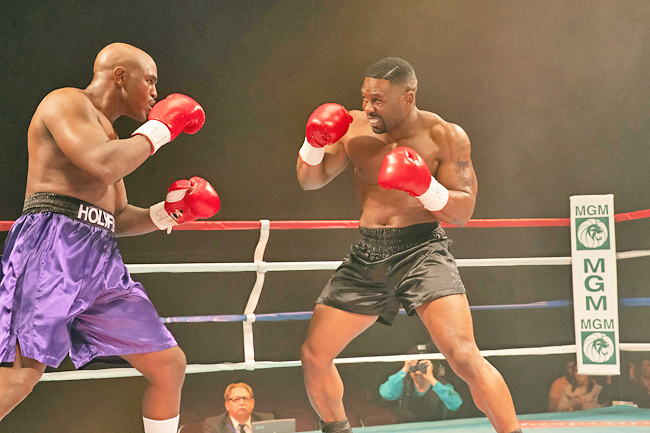THE WASHINGTON POST – Love him or hate him? That question is at the core of Hulu’s entertainingly hectic new miniseries about boxing legend, convicted rapist and pop culture touchstone Mike Tyson.
But unlike the real life champ with a killer right uppercut, Mike pulls its punches, never weighing in on which version of the superstar the audience should root for – which Mike should leave the ring victorious.
Is he the steely-eyed villain, the lovable rogue, the misunderstood little boy with a lisp so desperate for love he found it in a fist? The series is a split decision.
The show’s executive producers say Mike isn’t about who or what, but why. Piecing together Tyson’s story from “factual accounts, interviews, footage of real-life events”, the purpose of the eight-part drama “is to go beyond the sound bites and tabloid headlines, to create a deeper, more nuanced look at his complicated life”, according to a statement.
“Mike never attempts to portray Mike Tyson as a hero or a villain. Rather it aims to ask the viewer to re-examine a unique, sweeping, complex, contradictory life and decide for themselves what they think and how they feel,” the statement continued.
In his corner, Tyson, who was not consulted or compensated for the series, has been characteristically vocal about how he feels.

“Don’t let Hulu fool you. I don’t support their story about my life. It’s not 1822. It’s 2022. They stole my life story and didn’t pay me. To Hulu executives I’m just a man they can sell on the auction block,” the 56-year-old posted on Instagram.
So where does that leave the folks watching, caught between the latest series that serves as a 90’s pop culture love letter and the real-life subject who’d rather leave it locked in a drawer, or at the very least get a royalty cheque? With a case of whiplash, as a creative team that includes writer-director Steven Rogers (I, Tonya) and director Craig Gillespie (Pam & Tommy) clearly want to reveal Tyson’s true character without reveling in caricature, while simultaneously backing off from summary judgement.
It can be gut-wrenching, as when young Mike (Zaiden James) sits next to his mother as a White man behind a desk tells her that her son is “retarded”, another starting bell to a childhood marked by poverty, neglect, domestic abuse and bombed-out buildings in the Brownsville section of Brooklyn.
The show can also be heartwarming, as when 14-year-old Mike (B J Minor) cries silent tears after winning his first real fight, realising that he won’t be on the wrong side of a fist ever again. Then there’s grown-up Mike – embodied with incredible care by Moonlight’s Trevante Rhodes – who ate up all those earlier versions of himself after losing his mentor and trainer, Cus D’Amato (Harvey Keitel), and later his mother (Olunike Adeliyi).
Sprinting from one big defining moment to the next, punctuated with boxing scenes that are tertiary to the main tale, it’s hard to figure out what, if anything, the audience is supposed to glean from this immersive exhibit of This is Your Life: Mike Tyson.
Nothing is revealed, only dramatised, which is certainly entertaining – but illuminating? Sure, some Mikes seem easy to love – as D’Amato tells the former reform school kid in one of their many father-son moments – but other Mikes much less so, and connecting them harder still.
The miniseries uses a 2017 stage performance similar to Tyson’s one-man Broadway show, Mike Tyson: Undisputed Truth, as a narrative framework, so Rhodes’ Tyson appears to be telling us his story himself. The device lends an air of authority to the greatest (and lowest) hits he shares from the stage, a meta-version of what’s happening with the series as a whole.
But this is an unauthorised take. Despite all the fourth-wall breaking and tongue-in-cheek asides, in the end, we don’t learn anything that can’t be gleaned from a Wikipedia page or Tyson’s own highly publicised words.
Which isn’t to say that Rhodes doesn’t blaze as both storyteller and star. The actor slips into Tyson’s physicality and musicality with dexterity, echoing the fighter’s tightrope walk between awkward shyness and ferocious bravado. Equally scene-stealing is Adeliyi as Tyson’s suffer-no-fools single mother, Lorna Mae, playing her as both sympathetic and cringe-inducing.
She’s the woman who can’t figure out why her son can’t get right, the one who told him he’d never amount to anything, the one who wanted him to come back home when he moved in with D’Amato.
It isn’t until the fifth episode (the last available for review) that the show switches off Tyson’s take and turns the tale over to Desiree Washington (Li Eubanks), the 18-year-old beauty pageant star who the boxer was convicted of raping in 1992. All previous episodes are titled after some layer of Tyson’s character – Thief, Monster, Lover, Meal Ticket. But in Desiree, the champ is finally viewed through the lens of someone who has their own clear picture of who he is.







